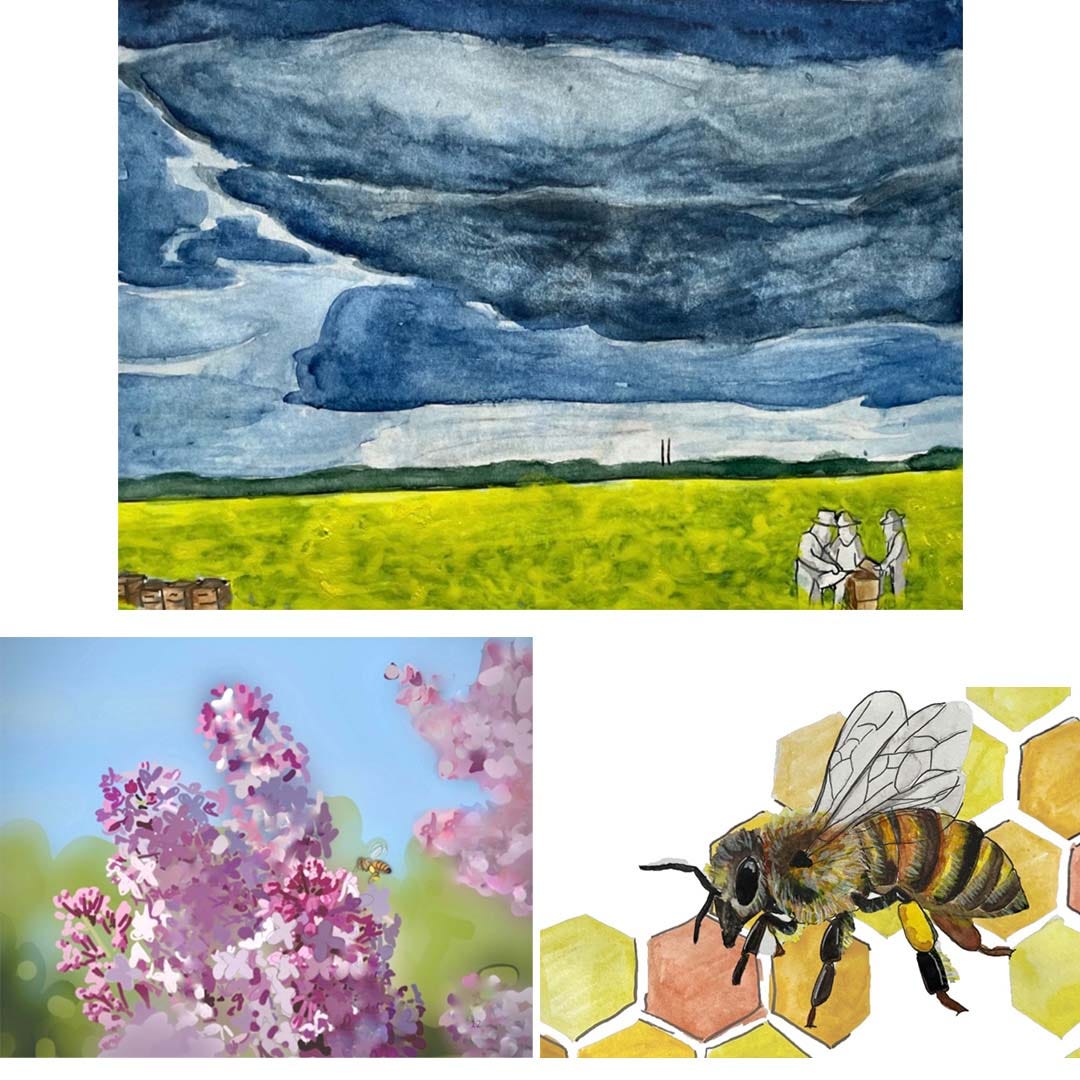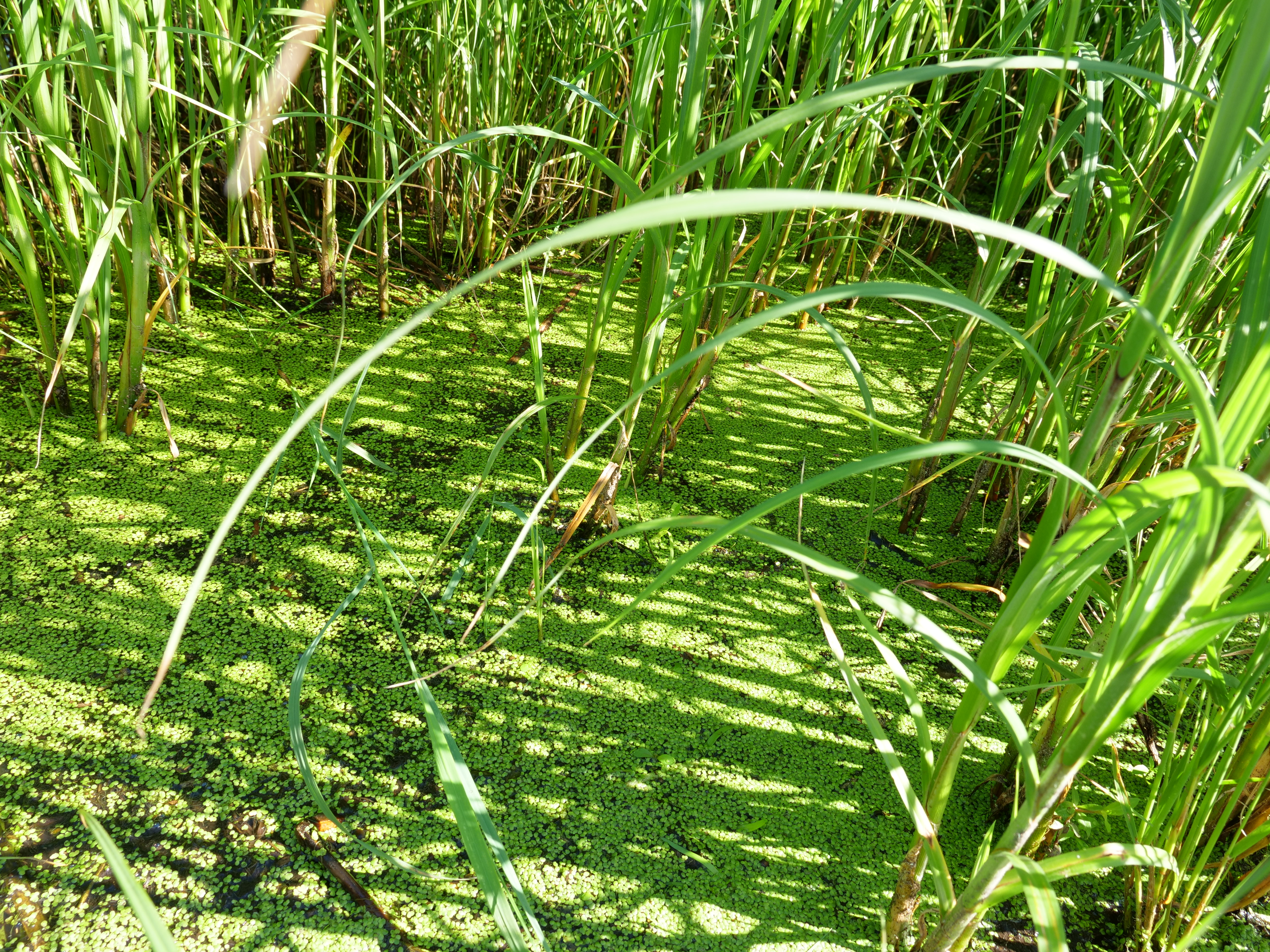2023’s FURCA Outstanding Sustainability Research Awards winners use visual art and video to educate audiences
Congratulations to 2023’s Festival of Undergraduate Research and Creative Activities (FURCA) Outstanding Sustainability Research Awards winners:
Hannah Kastelic
Bees may be the quintessential pollinator, but they are far from the only insect helping plants reproduce. Wasps, butterflies and even mosquitoes can transfer pollen from one plant to another.
These insects can also be important allies for farmers, according to Environmental and Conservation Sciences student Hannah Kastelic.
For her award-winning project, Kastelic researched which pollinators can be found buzzing about amongst the stalks, leaves and flowers of Canada’s biggest cash crops.
She used her findings to create an interpretive beginner’s guide for Alberta farmers who want to understand how the insects living in their fields can help their crops flourish. The guide is decorated with Kastelic’s paintings — primarily watercolours mixed with strokes of marker, gouache, gel pen, pencil and even some digital art — that portray in bright detail landscapes as well as closeups of insects.

While staple Alberta crops such as canola pollinate primarily using wind, farmers can boost their yield by keeping pollinators alive and healthy, Kastelic says.
Pollinators may also help farmers reduce their use of synthetic fertilizers, which can negatively impact soil health and the health of ecosystems near farmland.
In addition, Kastelic’s guide covers some important predator insects, such as spiders and beetles, which can help manage common agricultural pests.

“I wanted to convey to farmers that there are more insects involved in pollination and other beneficial functions than they may know, and that supporting these insects could help farmers in producing their crops. I would hope it would contribute to more sustainable agriculture, lessening chemical use and supporting the ecosystem overall around crops.”
Paul Sherk
Paul Sherk, a student in the Department of Earth and Atmospheric Sciences, combined his knowledge of groundwater issues with his flair for filmmaking in his award-winning project.
He made a 20-minute documentary that explores his research into unsustainable groundwater use in Alberta.
With birds-eye shots of Edmonton’s river valley, closeups of thawing ice and wildlife, stylish graphics, and a thumping electronic soundtrack, Sherk’s documentary tells the story of the dangers posed by groundwater overuse and groundwater pollution.
Many municipalities in rural Alberta depend on groundwater for their household needs, according to Sherk’s research.
However, many communities, as well as the province’s agriculture industry, are drawing water from underground aquifers faster than it can be replenished. Not only can groundwater overuse result in water shortages, it may also cause a phenomenon called subsidence, in which land resting on top of aquifers sinks into the ground — in some cases by as much as 28 feet — wreaking havoc on above-ground infrastructure.
At the same time, spills and leaks from extractive industries such as oil and gas contaminate groundwater, making it unsafe to drink.
Sherk makes a case for optimism in his documentary. He argues that maintaining Alberta’s native vegetation can protect groundwater from contamination, and if already contaminated, groundwater can be purified with new filtration technologies.
He also offers tips to minimize water use, such as keeping a jug of cold water in the fridge instead of running the tap until it gets cold, not running water when you are shaving or brushing your teeth, following water use guidelines and more.

“The reason I wanted to embark on this project is that I feel like a lot of this information is locked up behind paywalls in scientific journals. I wanted to take the information and display it in a form of media that’s accessible to the general public and is entertaining. That way, people unfamiliar with the topic don’t have to dive into the research themselves.”
Elpida Papathanasoglou
Women prisoners have different needs from their male counterparts, yet Canada’s prison system treats all genders the same, overlooking chances to help women prisoners reintegrate into society after they serve their sentences, according to criminology major Elpida Papathanasoglou.
For her research project, Papathanasoglou completed a literature review of available academic research on Canada’s female prison population to tell the story of what happens before, during and after these women are incarcerated.
She learned that prison protocols such as the custody rating scale — which classifies inmates as low, medium and high security risk — and mandatory minimum sentencing rules are applied similarly across all inmate populations but affect women disproportionately.
For example, Correctional Service Canada designed its custody rating scale with male prisoners in mind, and as a consequence, women prisoners are more likely to be placed in a higher security level than is necessary for their actions and crimes, according to Papathanasoglou’s review.
Women prisoners also tend to arrive in the prison system with histories of victimization, says Papathanasoglou, a problem that is intensified while they are in prison.
Papathanasoglou’s recommendations for improving the system include creating programs that utilize both government and academic research to increase transparency around the success of these programs, providing job training that covers useful and relevant skills for women prisoners, staffing prisons with female correctional officers to reduce sexual assaults against prisoners and creating more housing for recently-released offenders. She also recommends abolishing mandatory minimum sentences for low-violence and non-violent offenses and creating culturally-appropriate programming that recognizes the life stories of Black, Indigenous and people of color.

“The corrections system is built around the male offender — responding to, securing and providing for the male offender. It’s not built for female offenders. From beginning to the end the system is not built for them. We see mandatory minimums affecting them far more negatively than male offenders. We see denial of bail affecting them far more negatively. And see their experience in the institution affect them far worse.”
FURCA is the University of Alberta's annual, campus-wide celebration of undergraduate research, showcasing the research and creative achievements of undergraduate students across all disciplines.



